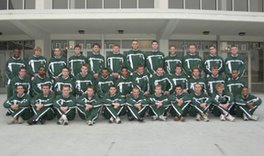Letter: Did cutting track and field really save the university money?
By Garrett Downing
Athens News Campus Reporter
Monday, June 4th, 2007
Over four months have passed since Ohio University decided to discontinue four varsity sports at the end of their 2007 campaigns, but those affected by the cuts are continuing to challenge the university's rationale for the unpopular cuts.
They say that contrary to the university's position, cutting some of the sports came only because of the need to comply with the Title IX gender-equity legislation, and did not save the university any money.
"It all boils down to Title IX for this sport," assistant track coach Mitch Bentley maintained.
Athletics Director Kirby Hocutt, however, said that eliminating women's lacrosse, men's indoor and outdoor track and field, and men's swimming and diving was necessary to address growing financial concerns within the department and also bring the university into compliance with federal Title IX provisions.
Hocutt acknowledged that the need to comply with Title IX did factor into the decision of which sports to cut, but the finances were the top concern.
"When you get down to it, this is a financial issue," Hocutt said. "If Title IX was not an issue, we would have still been in a position to discontinue athletic programs because of the financial state of our department."
Hocutt confirmed, however, that some of the real savings are coming from avoiding the significant investment needed to improve the quality of experience for the three men's sports. In other words, the university is saving money by not having to proceed with necessary and costly improvements in the sports.
While the OU administration said that the sports cuts have helped shrink the department's deficit, some are arguing that eliminating the men's sports is actually costing the university money.
With the track program, the department is saving no scholarship money because all of the scholarships are being retained by men's cross-country. The current system distributes scholarships between indoor/outdoor track and field and cross-country.
(The cross-country team is retaining all five scholarships, which is the maximum number of scholarships allowed by the NCAA, Hocutt said.)
Men's swimming and diving had very few scholarships to work with because the program was on a freeze with scholarships. Last season, it did not even sponsor two full scholarships.
The track-and-field and swimming-and-diving coaches will remain on staff to coach the women's programs, which results in no salary savings for coaching personnel. While eliminating the men's sports did remove the operating expenses, track and field has one of the lowest budgets of any college sport.
Also, by cutting the programs, the athletics department forgoes some of the Sports Sponsorship grants awarded by the NCAA.
The NCAA awards the university $22,000 for each sport that it sponsors above 14. Eliminating four sports results in annual lost revenue of $88,000. Records show that the university received $156,862 from the NCAA last July for the seven sports above 14.
Hocutt and Rob Andrey, associate athletic director for associate and internal operations, acknowledged that the financial savings for track and field and swimming and diving were not the key components of the cuts, but only part of a larger solution.
"Is the financial savings on the elimination of men's track and field significant? No it's not," Hocutt said "But the financial investment required was going to be very significant to get men's track and field to a level where it needed to be." Hocutt also said that eliminating the sports would improve the overall athletic experience for the sports that the university continues to sponsor.
Those affected by the cuts, however, are still waiting to see if the experience improves.
"I have been told it is going to (improve), and that is something we certainly expect to happen," head swimming and diving coach Greg Werner said. "It is interesting that we talk about improving our environment, yet the decision absolutely has worsened our environment in some aspects."
Werner noted that removing the men from the swimming-and-diving team has hurt the training atmosphere and the support system.
The majority of the financial savings came with the elimination of the women's lacrosse program. The athletics department identified lacrosse early in the process because of the significant savings of cutting the program, Hocutt said.
The department saved money by eliminating the 12 scholarships and the coaches' salaries of the lacrosse team. Also, the Mid-American Conference does not sponsor women's lacrosse, which made for a more expensive travel budget.
Because nearly all of the savings came from lacrosse, some people have argued that cutting the men's sports came only on the grounds of the proportionality clause of Title IX.
In order to comply with Title IX mandates, the athletics department must satisfy a three-pronged test, doing one of the following: 1. The number of student athletes must be proportionate to the male-to-female ratio of the student body. 2. Demonstrate a history of adding women's programs. 3. Satisfy the interests and abilities of women.
The department realized that it was not in compliance with the law, and needed to add another women's sport, or cut some men's sports. Due to the financial situation, adding sports was not feasible, and they had to resort to cuts, Hocutt said.
Men's track and field has been a target of sports cuts around the country partly because the male athletes of indoor and outdoor track count twice when counting total athletes (once for indoor and once for outdoor) for the purpose of Title IX compliance.
Deciding to cut men's sports to comply with Title IX, even without significant financial savings, proves that the law needs to be re-examined, Bentley said.
Hocutt said that the cuts, along with the addition of new policies within the department--such as increasing revenue -- will place the department in a much better financial situation in years to come. The department plans to operate with at least a balanced budget, if not a surplus, by 2011, Andrey said.
Subscribe to:
Post Comments (Atom)




















2 comments:
This country's never ending penchant for perceived equality will always be problematic.
I have no idea of the current situation but at one point I understood that the WNBA was being propped up financially (I think by the NBA) since it could not stand on its own. I don't know anyone who has actually watched a complete game either in person or on network TV.
Why should losing (and I mean financially losing) departments, organizations, companies, etc. be maintained if they cannot stand alone (and although I love it I would throw PBS into that group.) We live in a free market society. Let it work.
Start Young. Play Strong.
CallChuck
www.MarathonDigitalMedia.com
< Why should losing (and I mean financially losing) departments, organizations, companies, etc. be maintained if they cannot stand alone >
One problem I see with this statement is that if a university were to cut a team, department.... that couldn't stand on it's own, then you may end up losing the entire athletic department
Post a Comment